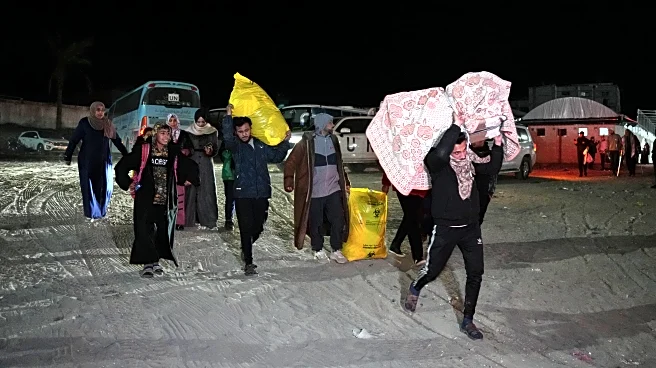What's Happening?
Israel has asserted its control over security in Gaza despite a US-brokered ceasefire agreement that includes the deployment of an international security force. Prime Minister Benjamin Netanyahu emphasized that Israel will independently decide on security measures
and which countries can send troops to enforce the truce. An Egyptian convoy has entered Gaza to assist in locating the remains of Israeli hostages, with approval from Netanyahu. The ceasefire stipulates that an international force, primarily from Arab or Muslim countries, will secure Gaza as Israeli forces withdraw. However, Israel opposes Turkey's involvement and insists on maintaining overall security control.
Why It's Important?
The situation in Gaza has significant implications for regional stability and international relations. Israel's insistence on controlling security could affect the implementation of the ceasefire and the role of international forces. The humanitarian crisis in Gaza remains severe, with aid agencies struggling to provide sufficient relief. The ongoing conflict and Israel's security measures impact the lives of Palestinians, with many facing dire conditions. The ceasefire's success is crucial for reducing hostilities and facilitating reconstruction efforts, but Israel's stance may complicate diplomatic efforts and affect relations with neighboring countries.
What's Next?
The international community will closely monitor the situation in Gaza, particularly the role of the international security force and Israel's actions. The US and its allies have established a truce monitoring center in southern Israel to oversee the ceasefire's implementation. The main Palestinian factions, including Hamas, are forming a committee to administer Gaza alongside reconstruction efforts. However, Hamas's resistance to disarmament poses challenges to the ceasefire's stability. The recovery of hostages remains a priority, with ongoing efforts to locate and return the bodies of those still missing.
Beyond the Headlines
The ceasefire agreement and Israel's security control raise ethical and legal questions about sovereignty and the rights of Palestinians. The humanitarian crisis in Gaza highlights the need for international intervention and support. The conflict's long-term impact on regional dynamics and peace efforts remains uncertain, with potential shifts in alliances and power structures. The situation underscores the complexities of achieving lasting peace in the region, with ongoing tensions between Israel and Palestinian groups.
















